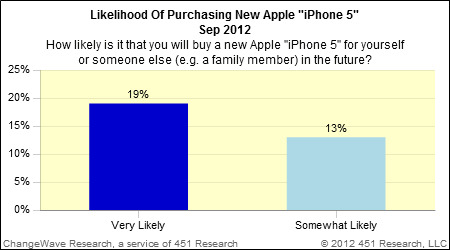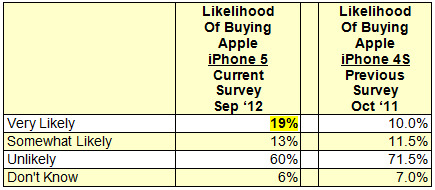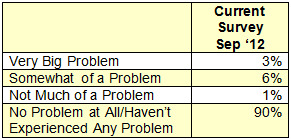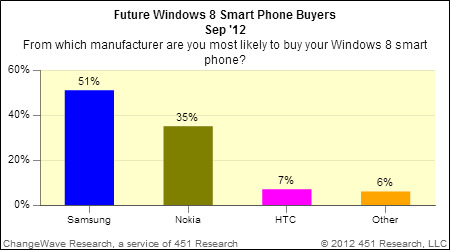iPhone 5 appeal unblunted by Apple Maps says research
Teething problems with Apple Maps failed to blunt mass market enthusiasm for the iPhone 5, new research suggests, with demand significantly higher than ahead of the iPhone 4S. 451 Research and ChangeWave Research surveyed 4,270 consumers in September, and found that those saying they were "very likely" to buy an iPhone 5 were almost double the number of those saying the same thing ahead of its predecessor's release last year. Meanwhile, Windows Phone 8 could "make serious inroads in the smartphone industry" the researchers claim, surprisingly highlighting Samsung as likely to be the manufacturer that benefits the most.

While some suggested that the poor performance of Apple Maps might sour the iPhone 5's appeal, consumers don't appear to have reached the same conclusion. Only 3-percent of those iOS 6 users questioned said Maps presented a "very big problem" to them, while 90-percent said it was "no problem at all"; in fact, the change to the new Lightning port was more of an issue, with 6-percent saying the different connector was a "very big problem." Only 26-percent said it was "no problem at all."

"Despite the media attention surrounding both the Apple Maps issue and the Apple Lightning port issue, neither has had an impact on the massive numbers of buyers queuing up to buy the iPhone 5," said Dr. Paul Carton, ChangeWave's VP of Research. "Rather, the survey results show both issues hardly rank as bumps in the road."
In fact, those who decided not to buy the iPhone 5 mainly did so because they were content with their existing device, according to the ChangeWave research. 61-percent said "their current cellphone is sufficient" while no respondents said it they were dissuaded because of "reported problems with Apple Maps."
"Has Apple Maps been a problem for you?":

As for Windows Phone 8, 2-percent of respondents said they were "very likely" to buy a phone running the OS in the future, while 7-percent said they were "somewhat likely"; integration with existing Windows apps and devices was the most cited reason for that decision, at 36-percent of the responses.
Most interestingly, though, despite Nokia and HTC being the two brands who have put the most effort into Windows Phone 8 device launches, it's Samsung which gets most cited as the go-to manufacturer. Of the 55-percent who knew which Windows Phone 8 OEM they were likely to buy from, just over half said Samsung would be their brand of choice, with Nokia following in second place.

